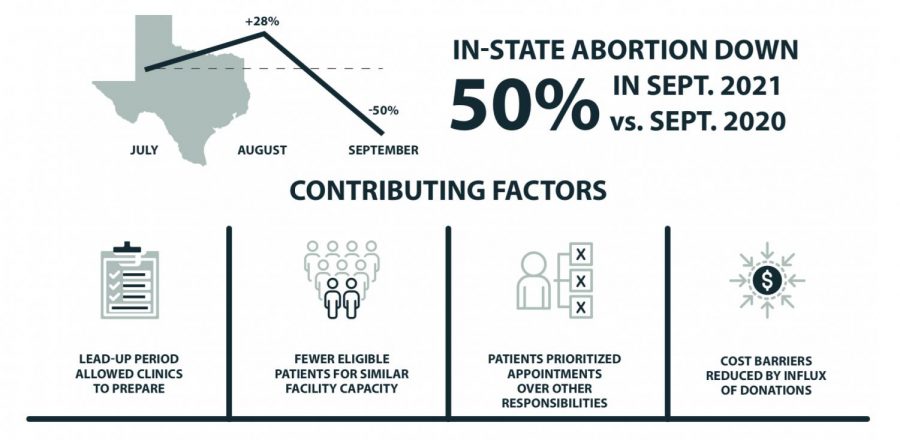UT researchers found Texas’ abortion rates decreased by 50% following new law
November 10, 2021
The number of abortions provided in Texas for the month of September decreased by 50% compared to the same period last year due to the implementation of the state’s restrictive new law, according to a study by UT researchers.
Researchers from the Texas Policy Evaluation Project collected data from 19 clinics that provide 93% of the state’s abortions. These clinics performed 2,164 abortions in September 2021, as opposed to the 4,313 administered in the same month last year, according to the study. The decline is due to Texas Senate Bill 8, which bans abortions about six weeks into pregnancy, that took effect Sept. 1. Researchers found that over 40% of people seeking abortions do not contact a provider until after six weeks of pregnancy because they likely do not know they are pregnant.
“It’s incredibly restrictive in regards to the timeline,” said Vanessa Sayroo, president-elect of UT’s sexual assault prevention group Not On My Campus. “If you aren’t actively trying to get pregnant, it’s possible you won’t know you’re pregnant until at least two months. It could be longer for women who have irregular periods, or for many other reasons.”
Abortion rates increased by 28% in August 2021 compared to the same period last year, which researchers concluded was likely the result of clinics expanding hours of operation to allow for more accessibility to procedures before the law took effect.
People may now go to neighboring states to obtain abortions, which has caused increased wait times for out-of-state clinics compared to July 2020 before SB 8 went into effect, according to the study.
Out-of-state abortions can total over $1,000 due to the cost of the procedure, travel expenses, lost wages and lodging, according to the study.
Researchers found that wait times of two weeks or more were common at facilities in Louisiana, New Mexico and Oklahoma, at which point some pregnant people may be past the limit for medication abortion or into their second trimester when it is harder to have an abortion.
“Among those most affected will be minors who cannot involve a parent in their care, immigrant families who fear encounters with police and border enforcement, parents who have limited childcare options and people living at or below poverty, many of whom are Black, Latinx and other people of color,” the study said.
Madison Fail, a member of Students Against SB 8 at UT, said she was not surprised to see that low-income families and people of color are disproportionately affected by the ban.
“The people who are leaving the state are the people who have the resources to do so,” government freshman Fail said. “But there are so many people that do not have that option.”
The Supreme Court is currently looking into the constitutionality of SB 8. Researchers concluded that abortion levels may continue to decline if SB 8 stays in effect longer because of decreased financial donations to clinics and a low patient volume forcing clinics to reduce hours, which would reduce access to appointment scheduling and push some people past six weeks of pregnancy.
“If the Court allows legal challenges to SB 8 to proceed, the lower courts may rule that Senate Bill 8 is unconstitutional, and services could resume in Texas,” principal researcher Kari White said in an email. “However, it is unclear whether the network of care will be affected in the long term (such as by reduced staffing or clinic hours), even if services do resume.”



